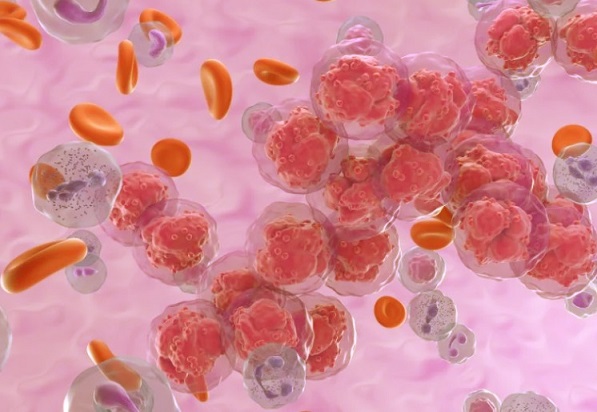Oncologists Warn That Mild COVID-19 Can Cause Relapses in Leukemia Patients Previously in Remission
Nikhil Prasad Fact checked by:Thailand Medical News Team Jan 15, 2025 3 months, 1 week, 3 days, 22 hours, 6 minutes ago
Medical News: COVID-19’s Silent Threat to Leukemia Survivors
A groundbreaking study has revealed an alarming phenomenon: mild cases of COVID-19 can cause temporary molecular relapses in leukemia patients previously in remission. Conducted by researchers at UMass Chan Medical School in Worcester, Massachusetts-USA, the study delves into how the SARS-CoV-2 virus triggers immunosuppression, potentially disrupting the delicate balance of cancer remission. The findings underscore the need for heightened vigilance and molecular monitoring in cancer survivors recovering from viral infections.
 Oncologists Warn That Mild COVID-19 Can Cause Relapses in Leukemia Patients Previously
Oncologists Warn That Mild COVID-19 Can Cause Relapses in Leukemia Patients Previously
in Remission
Case Reports Highlight Unexpected Relapses
The study focused on two leukemia patients with vastly different journeys but a shared challenge: temporary molecular relapse following COVID-19. The first case involved a 52-year-old woman diagnosed with acute promyelocytic leukemia (APML), a subtype of acute myeloid leukemia (AML) known for its curability. Her treatment with all-trans retinoic acid (ATRA) and arsenic trioxide (ATO) led to deep molecular remission, characterized by undetectable leukemia markers in her blood.
This
Medical News report discusses how she remained PCR-negative for over 13 months, showcasing the effectiveness of the therapy. However, six weeks after recovering from a mild COVID-19 infection, molecular testing revealed the reappearance of PML/RARα transcripts - a sign of relapse. Interestingly, the relapse resolved without additional anti-leukemic treatment, and she returned to molecular remission within weeks.
The second case featured a 60-year-old woman with chronic myeloid leukemia (CML). She achieved complete molecular remission after years of targeted therapy but experienced a brief relapse two weeks after contracting a suspected viral respiratory infection, likely COVID-19. Like the first patient, she regained molecular remission without further leukemia treatment.
Mechanisms Behind Viral-Induced Relapse
The study’s authors - Ishan Bhatia, Lloyd Hutchinson, and Jan Cerny - propose several mechanisms for these relapses. SARS-CoV-2 has been shown to weaken both innate and adaptive immunity, reducing the body’s ability to keep leukemia at bay. T cells, crucial for cancer surveillance, are particularly affected. Research indicates that the virus can infect CD4+ T helper cells, impairing their function and leading to temporary immunosuppression.
“This immunological disruption creates a window of vulnerability where dormant leukemia cells may resurface,” explains Dr. Bhatia. Viral infections are also known to suppress natural killer (NK) cells and CD8+ T cells, which play critical roles in targeting abnormal cells. In older patients, these immune deficits are more pronounced, increasing the risk of relapse.
Broader Implications for Cancer Patients
The findings hav
e significant implications for patients with other cancers monitored through molecular markers. If SARS-CoV-2’s immunosuppressive effects can trigger relapses in leukemia, similar mechanisms could affect individuals with lymphoma or other malignancies. The researchers urge oncologists to maintain close molecular monitoring for cancer patients who contract COVID-19, regardless of the infection’s severity.
Molecular Evidence and Patient Monitoring
Detailed molecular data provided by the researchers demonstrate the transient nature of these relapses. For instance, the APML patient’s PML/RARα transcript levels spiked temporarily before returning to undetectable levels, as documented through consistent PCR testing. Such fluctuations highlight the need for frequent testing and individualized follow-up plans for leukemia patients recovering from viral infections.
The Role of Viral Oncogenesis
Beyond immunosuppression, the researchers explored the direct oncogenic effects of SARS-CoV-2. The virus’s nonstructural proteins, such as Nsp3, can degrade tumor-suppressor proteins like p53, facilitating unchecked cell proliferation. Similarly, the Nsp15 protein may disrupt the Rb tumor-suppressor pathway, further compounding the risk of relapse.
These molecular insights suggest that SARS-CoV-2 is not just a respiratory pathogen but also a potential oncogenic agent in vulnerable populations. Dr. Hutchinson emphasizes, “Understanding these pathways will help us develop targeted interventions to mitigate relapse risks in cancer survivors.”
Practical Recommendations for Patients and Providers
Given the study’s findings, oncologists are advised to:
-Increase molecular surveillance for leukemia patients post-COVID-19 recovery.
-Counsel patients on the potential risks of viral-induced relapse.
-Advocate for preventive measures, including vaccination and antiviral therapies, to reduce the likelihood of infection.
Patients, too, are encouraged to report any symptoms or changes in health promptly and adhere to follow-up testing schedules.
Conclusion
This study sheds light on an underrecognized risk faced by leukemia patients in remission. Viral infections like COVID-19 can disrupt the immune system’s ability to maintain cancer suppression, leading to temporary relapses detectable through molecular testing. While the relapses in these cases resolved without further treatment, they highlight the fragile balance maintained by immune surveillance.
For leukemia patients and survivors of other cancers, these findings reinforce the importance of proactive monitoring and care. Oncologists must remain vigilant, especially in the context of emerging viral threats. As Dr. Cerny aptly concludes, “Understanding and addressing these challenges is crucial for ensuring long-term remission and improving patient outcomes.”
The study findings were published in the peer-reviewed journal: LabMed.
https://www.mdpi.com/2813-9038/2/1/2
For the latest COVID-19 News, keep on logging to Thailand
Medical News.
Read Also:
https://www.thailandmedical.news/news/french-researchers-warn-that-hmpv-infections-could-possibly-cause-chronic-lymphocytic-leukemia-like-lymphocytosis
https://www.thailandmedical.news/news/covid-19-news-while-lymphopenia-is-common-in-sars-cov-2-infections,-some-may-suffer-from-b-cell-lymphocytosis,-that-leads-to-lymphocytic-leukemia
https://www.thailandmedical.news/news/covid-19-news-can-sars-cov-2-cause-reactivation-of-the-latent-sexually-transmitted-htlv-1-virus-that-causes-t-cell-leukemia-lymphoma-atl
https://www.thailandmedical.news/news/breaking-sars-cov-2-upregulates-proteins-adgrd1-gpr133-and-adgrg7-gpr128-that-are-linked-to-cancer-progression
https://www.thailandmedical.news/news/covid-19-news-scientists-warn-that-existing-mrna-covid-19-prophylactics-create-environment-for-neoplastic-transformation-leading-to-various-cancers
